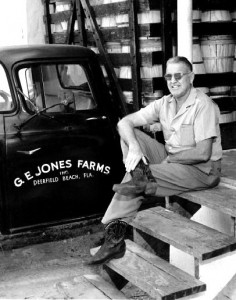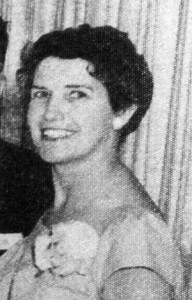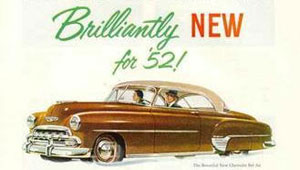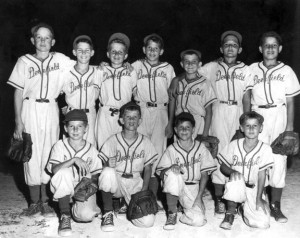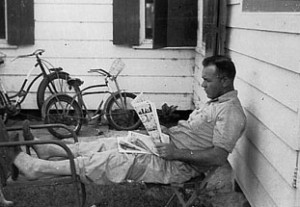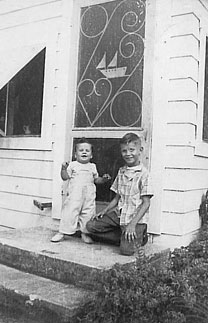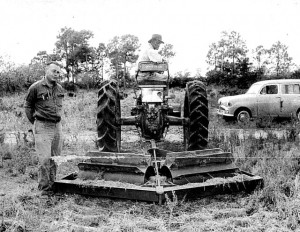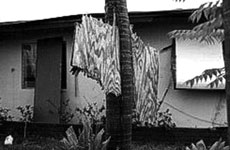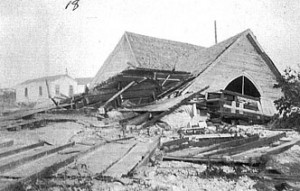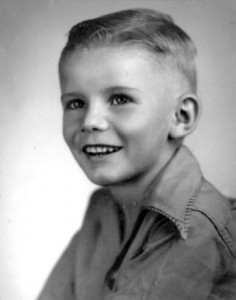Historical Essay 30
Watching Hopalong Cassidy on TV in 1951 got me in trouble with the law
Published: 17 Apr 2008
Well, I guess it wasn’t really Hopalong’s fault. But when you are 10-years-old and are used to watching the exciting adventures of the famous cowboy Hopalong Cassidy every Saturday morning, it hurts when you can’t watch it one Saturday. My problem was that we didn’t have a TV set. In fact, hardly anyone in Deerfield Beach had a TV set.
The first person in Deerfield to get a TV set was Doctor Higgins. He was a very tall man, kind of bald, and the only doctor in town. He practiced his medicine initially in the same house where he lived with his wife and daughter, Betsy, who was my age. Their house and office was on Hillsboro Boulevard, across from the U.S. Post Office, in the same house that the Kraeer Funeral Home is in today. Betsy was tall and skinny, had long blonde hair and wore glasses. We were friends, but not too good of friends. She was taller than me by two or three inches, and one of my biggest competitors for getting the best grades in our class at school. When the Higgins first got a TV set, we were all invited to come over and watch on Saturday. But after the second or third week, Betsy told us we couldn’t come anymore because her father had said that he had patients coming and we might disturb them.
We children were heartbroken. No TV? No Hopalong Cassidy on Saturday?
But it didn’t take long for one of our fathers to step up and pay the price to buy “all” of us kids a TV set. Well maybe it wasn’t really for “all” of us, but it seemed like it at the time. Mr. Allan Ballard (the father of Johnny Ballard, who recently retired as the longtime chief of police in Hillsboro Beach) stepped up to the plate and bought the second TV set in Deerfield Beach. Not only that, but he and his wife, Miriam, let it be known that all the children in the neighborhood were welcome to come to their house on Saturday morning and watch it with Johnny and their daughter, Susie. Their house was located on property which is now part of Deerfield’s City Hall east side parking lot.
Everything was going along fine with our TV watching for months until one Saturday morning we got to their house and no one was home. One of the kids said that he heard they had gone up to Georgia on a vacation or something. I remember thinking, “They must have left us a key or something so we could get in to watch Hopalong.” We looked under the front door mat. No key! We looked under all the flower pots. No key! We started to panic, because Hopalong was going to start in a few minutes. Maybe they forgot to leave us a key!
Suddenly I got a great idea. I told the kids I’d be right back. I ran as fast as I could the 100 yards or so to my Dad’s shop. I ran in to where I knew there was a crow bar. I grabbed it and ran as fast as I could back to the Ballard’s house. Someone scooted an old chair from their backyard up to a side window.
I stood up on the chair and used the crow bar to pop open the wood frame window. Pushing it up as far as it would go, I pulled myself up to the window sill and scrambled inside their house. I ran to the TV and turned it on, and then came back to help the other kids get into the house. We all made it inside and sat down on the floor to watch just as Hopalong Cassidy came on. “Whew,” I thought. “Barely made it!”
We hadn’t been watching Hopalong five minutes, when suddenly a deep voice came through the open window: “What do you kids think you’re doing breaking into Ballard’s house?” I looked over and recognized the policeman. Everyone else kind of froze, so I got up to explain to him that we always come over on Saturday morning to watch TV at the Ballard house. He responded by asking, “Do you always come in through the window?” I said, “No, but I’m sure it is all right. Mr. Ballard just forgot to leave us the key!”
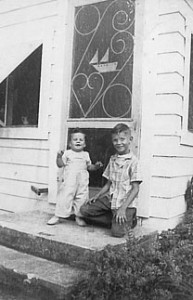
I could tell he was trying to keep a straight face. He asked who brought the crow bar. I raised my hand. He told everyone else to go home, but ordered me and Tommy into his car. He drove us the 100 yards or so to my father’s machine shop. We got out and went in. Dad was running a lathe. The policeman told Dad where he’d found us. Dad stopped the lathe, looked around real serious-like, and said “Guess you’ll have to put ‘em in jail!”
I couldn’t believe it. I started to cry. As we turned to get back in the car, Dad hollered out and told the policeman, “Be sure to get their fingerprints too!”
It seemed like a long ride back to the police station,” even though it was only two blocks. We went in and the policeman had us dip our thumbs in an ink pad and put them on a pad of paper. Deerfield had its own jail at the time and most of the prisoners were local drunks. I could hear them laughing and making fun of us; and I was really scared. About that time, Dad walked in. He said something to the effect, “Do you think he’s had enough?” The policemen nodded, and then he and Dad started laughing. The policeman then said to us: “Let this be a warning. The next time we might have to put you in there with those guys,” as he pointed toward the drunks in their cells.
It was a lesson I never forgot.
David Eller
Historical Essay 29
James and I thought we were Tom Sawyer and Huckleberry Finn
Published: 3 Apr 2008
My friendship with James Stills got off to a rough start. When he arrived at Deerfield Elementary School from Tennessee, he immediately became the biggest kid in our class of fifth graders. With his large crop of wavy black hair, brown eyes and enormous hands, he was also an inch or two taller than me and classmate Dewey Bennent, and probably out-weighed us by 10 or 12 pounds. When recess came on his first day at our school, Dewey pulled me aside and suggested that we needed to find out “how tough” the new kid was. Dewey said that he would get on his knees behind James and I should walk over and pretend to “fall” into James so that he would be knocked over Dewey. We did it perfectly, expecting James to get up ready to fight. James got up from the fall, but did not respond to our belligerent attitude. He simply looked at us and our fists poised for a fight and said, “My mother told me not to be fighting.”
I was immediately relieved as I’d already figured out that I didn’t want to fight him anyway, and I didn’t think Dewey did either. It was just our way of sizing him up. I kind of liked the way he handled us, and decided immediately that I wanted to be his friend. So on Friday, I invited him to come to Sunday school and church at First Baptist on Sunday morning at 9:30. Sure enough, he showed up with his mother and his sister, Barbara, who was two years older than him. Thus began a life-long friendship, which continues to this day.
We began our friendship as 10-year-old boys by exploring the swamp near our house just east of Dixie Highway. The swamp was just over the Dixie Highway Bridge north of the Hillsboro River in what is now part of Boca Raton. Boys of Southern heritage at the time were expected to learn how to shoot a gun by around the age of 10, and I was no exception. Dad and Mother had given me a pellet rifle for my 10th birthday and Dad had taken me down to the swamp to practice. We shot land crabs. They are interesting creatures with blue bodies about four inches in diameter, with eight legs which can carry them quite rapidly when they decide to run. They typically live in swampy areas in holes in the ground, which they dig down a few feet to hide from predators like big birds and 10-year-old boys. James and I took turns shooting the rifle and watching the crabs explode.
One of the books that was required reading in school at the time was The Adventures of Tom Sawyer and Huckleberry Finn. James and I were just the right age to really get into that book. One of the episodes, which thrilled us both a lot, was when Tom and Huck built a raft with a sail and rudder to explore the Mississippi River. With encouragement and help from my parents, James and I built our own raft to sail up and down the Hillsboro River. The main body of the raft was made from bamboo, which at the time was plentiful growing at the edges of the Hillsboro River. We only selected and cut down bamboo shoots that were at least four inches in diameter. We selected about 20 shoots and sawed them into lengths eight feet long. We then strapped them together with aluminum flat bar straps which Dad had provided, to make the raft. A steel plate with a pipe welded on top in the middle supported the mast for the sail. Mother provided a bed sheet sail for the mast, and I built the rudder from ¼” plate steel in our welding shop. Dad helped us get everything assembled and transported 100 yards or so, down to the Hillsboro River where we launched it.
It worked beautifully. We quickly became pretty good sailors. James worked the sail and I worked the rudder. Typically, we would let the tide current take us east, and then put the sail up and let the easterly breeze fill our sail and carry us back to the west. We did it over and over again until we got tired. Tom Sawyer and Huckleberry Finn would have been proud. We had lots of fun.
David Eller
Historical Essay 28
Standing up for German neighbors got me into a fight at school
Published: 20 Mar 2008
In the fall of 1951 we had a German family move into the two-story house at the end of our block. They had two children, a boy and a girl. The boy was my age and his name was Martin Marback. He had bright red hair, and wore leather pants with white shirts and suspenders. He did not speak much English when we first met, but he was really good at climbing the mango trees with me which were in the grove between our houses. Therefore, our play was mostly limited to climbing trees, gathering the mangos, eating some and putting the others in a box for my mother to give away. I quickly learned that he did not understand hardly anything I said, but would copy me in almost anything I would do.
His sister, who was two years older than him, also wore “funny” clothes: typically a white blouse over a red, black and white plaid skirt. She was way overweight, and had long brown pigtails. Whereas her brother Martin was kind of skinny like me. Martin would try to speak some English with me, but I do not remember his sister ever speaking a word. She would simply stand back and watch Martin and me play.
By the time Deerfield Elementary school started in September, Martin and I had become “friends”, even though we could not communicate very well.
We had only been in school a few days when “the fight” happened. About six of us were lined up in front of the water fountain to stand upon a wooden box and get a drink of water. Martin was in front of me. Robert Sloan, a year younger than us, but a few inches taller, was at the end of the line. Suddenly, when Martin started to get his drink in front of me, Robert Sloan jumped out of the line, rushed forward, grabbed Martin by the back of his head pushing his face into the fountain and twisted the fountain handle to keep the water flowing onto Martin’s face as though he was trying to drown him. He also was simultaneously screaming “you’re a dirty Nazi.” Martin started sputtering, lifted his head and tried to get away from Robert and the fountain.
Before I could even think about it I grabbed Robert Sloan’s shoulder with my left hand and shoved him backwards away from Martin and the fountain. He responded by hitting me with his right hand to the side of my face. I tackled him and we proceeded to roll around on the floor of the hallway with fists flying. Everyone else was screaming. Within seconds it seems, Ms. Henry, the school principal, was there and grabbed the back of my shirt collar pulling me up and off of Robert.
Ms. Henry took us into her office around the corner from the water fountain, and demanded to know why we were fighting. I told her that Robert started it by attacking Martin. She asked him why? He told her that his father had been a soldier and Germans had killed a lot of his father’s friends. She looked at both of us kindly, but firmly told us that fighting was not allowed. She told us to go to the chair next to her desk and bend over, then she reached for a wooden paddle. She proceeded to spank both of us with about three strong licks. Neither of us cried, but neither did we ever fight again.
David Eller, Publisher
Historical Essay 27
In 1951 the world is changing–Deerfield starts growing–and more boys my age move to town
Published: 6 Mar 2008
In 1951, the Korean War was going on and Seoul, Korea, fell to the communist forces from the north. The 22nd Amendment to the U.S. Constitution, limiting the number of terms a president may serve, was ratified. Julius and Ethel Rosenberg were sentenced to death for treason, having given the Soviet Union our secrets for building atomic bombs. The cost of a first-class stamp was $0.03. The NY Yankees defeated the NY Giants in the World Series 4-2. Color television was first introduced in the USA, and the Best Movies were The African Queen and A Streetcar Named Desire, and for most of the year, I was nine years-old.
My father always said that Deerfield and this northeast Broward County area started to grow because so many of the soldiers who were based at the Boca Raton Airfield during World War II liked the weather here, and eventually decided to come back to live permanently. I’m sure that was true in the big picture of things, but from my perspective as a nine-year-old boy, it was when the Williams Dairy arrived, located where Century Village is now, that Deerfield started to grow.
Mr. Williams moved his dairy here from Dade County in 1950-51. He had two sons, Mitchell, who was two years older than me, and Donald, who had the nickname “Peewee,” who was my same age. They were both very athletic, and could ride their own horses at their father’s dairy. Also two other boys, Jimmy Phillips and Jessie Beard, whose fathers worked on the dairy, were in our class, as well as Tommy Gannon, whose father was an electrician and mother was a nurse, had just arrived in town. Tommy and I became good friends as he lived only two blocks away. When summer came and our Baptist church had Vacation Bible School (VBS), he and I were both surprised and confused when his parents told him he could not go to our church for VBS. (An annual event in the summer where the kids learned stories from the Bible, and got lots of ice cream). His mother kindly explained to me that Tommy and their family were Catholics and even though they did not have their own church to go to in Deerfield yet, she didn’t want Tommy to get confused and therefore did not want him to go to VBS at our church. Tommy and I looked at each other in a somewhat confused manner, but quickly acquiesced to her instruction. When I asked my mother about it, she explained that this was normal, that it was good that Tommy’s parents were religious, and that Tommy and I could still be friends.
Meanwhile, Miss Hinson (my mother called her an old maid) was our teacher in the fourth grade at Deerfield Elementary School. She had previously replaced our third grade teacher, Miss Riggs, in the third grade. Miss Riggs only taught us for a few months, when our principal, Mrs. Henry “fired” her. I was later told that I was the one that had gotten Miss Riggs fired. I didn’t mean to. I only told my mother and father that Miss Riggs was a lot different than Mrs. Slover, our second grade teacher, or even our first grade teacher, Mrs. Hartman. Specifically, Miss Riggs did not have us say the Pledge of Allegiance to the American flag, and she had us singing songs from a country called Russia, which she had said was the best country in the world. My mother later told me that Miss Riggs had been fired because she was a communist. My, how things have changed.
David Eller
Historical Essay 26
Lyons Road named after Dad’s largest customer
Published: 31 Jan 2008
Back in the late 1940’s and early 1950’s, when I was a boy of elementary school age, my father Marlin would often take me with him after school as he visited customers. Our machine shop/pump factory was located on Dixie Highway in Deerfield, where the tennis courts are today. In previous Essay No. 13, I wrote about our good customer, the Butts family in Boca Raton, for whom the Butts road in Boca is named. In Essay No. 14 I also wrote about our Japanese customers in Boca and the Japanese farmers there for whom the Yamato Road and Park is named.
However, our largest customer back in those old days was a rancher and farmer west of Deerfield named Cossie Lyons. I believe he was originally from Tennessee. I do know that he owned an enormous amount of land in the northwest part of Broward County and southwest part of Palm Beach County, which is now part of Parkland, Coral Springs, and western Boca Raton. I remember my father telling me once that Cossie’s property, just on the west side of Highway US441/State road 7, was approximately six miles long and two miles deep. He raised cattle mostly, but also had large plots of vegetables on parts of it.
My dad and Cossie Lyons were good friends. Cossie, in his sixties, treated my father, in his thirties, like a son. In fact, I was there when Cossie offered to give my father 10 acres on the west side of Highway 441 for Dad to build us a new machine shop/factory. Dad, accustomed to walking out the back door of our house on Dixie Highway to go to work in our “shop” next door, turned him down. I remember Dad telling Mr. Lyons: “I don’t want to have to drive that far (seven miles) to go to work every day”.
Cossie was a single man with no children, and depended a lot upon his nephew, James, to actually run the farm. James, about my dad’s age, always wore a crumpled old brown hat, and had two or three horses which he took turns riding. Dad and Cossie would talk about what needed to be done on the farm, and James would make it happen.
Cossie also had a beautiful young secretary/bookkeeper named Alma. In her late twenties, she was taller than Cossie or my father by about six inches. She had long black hair and always dressed up, even in their office. She wore high heels and a fancy hat when she sometimes came to Deerfield’s First Baptist church, where she always sat alone midway down the left aisle. The hat and the heels made her look even taller.
One day Cossie confided to Dad that he and Alma were going to get married. When Dad told Mother over our supper table that night, Mother got very upset. I remember her saying that Cossie was way too old to marry that young woman. Dad just smiled.
Shortly thereafter Cossie Lyons and Alma were married in a private ceremony and went off on their honeymoon. The next day Dad got a call from Cossie’s nephew, James. He told Dad that Cossie had died from a heart attack on the first night of his honeymoon. Alma, therefore, became a rich young widow within hours of her marriage to Cossie.
Alma continued to come to our church occasionally, and was always friendly to my father. The women of the church, however, seemed to keep her at a distance. Within a few years she had sold off Cossie’s land and moved to Gatlinburg, Tennessee. She got married again to another short man and became Mrs. Alma Regan. Together they invested in real estate and helped build Gatlinburg into the huge resort that it is now. She died about 20 years ago, probably with a smile on her face.
David Eller
Historical Essay 25
Big 1949 Hurricane with 150 mph winds…plus another boy my age (8) arrives in Deerfield
Published: 13 Dec 2007
It was right before school started in 1949 when the big hurricane hit. Back then they had not gotten around to giving hurricanes names like they do now. They simply numbered them in order. The center of Hurricane No.1 of the 1949 season hit “between Pompano and Palm Beach” about 6 p.m. on August 26. Winds had to have been over 150 mph when it hit because they were actually measured at 125 mph as the center crossed Sebring, Florida a few hours later. Dad had shuttered up our house and driven the family to Boynton Beach to ride out the storm at my maternal grandparent Horton’s house, next to Boynton’s elementary school. However, as the hurricane approached the coastline, the winds picked up, and Granddad Horton’s wooden frame house started coming apart. There was a large screened porch facing south, which was the first to go. The screens blew out and the roof started tearing off in pieces. My father, Marlin Eller, ordered me, my mother, Lorena, and my sister, Linda, to follow him. He held my little brother, Dwight, in his arms and started toward our car parked in front of the house. But the wind was too strong to stand up, and tree branches and coconuts were flying through the air hitting us. So Dad lay on the ground and started rolling toward the car. We couldn’t hear his specific instructions through the loud howling of the wind, but we just naturally started doing the same thing he was doing and rolled on the ground to the car. He got one door open on the other side of the car and we all crawled in. I remember Dad was shivering and seemed afraid. Mother was crying.
Dad started the car, drove a few blocks over to Federal Highway, U.S. 1, turned left and headed north. I remember him saying that this direction should get us out of the storm. We drove through heavy rains and winds, for what seemed like hours, until we got to a town called Fort Pierce. There, palm trees had fallen across the highway, coconuts and tree branches were flying through the air, and it was impossible to proceed. Dad turned into a gas station and parked, joining dozens of other cars parked there. There we spent the night, in the car, mother especially praying for safety. It came the next morning as the winds died down. We got gas in the car, headed home to Deerfield, working our way around fallen trees and power lines all the way. Granddad’s house in Boynton was essentially destroyed, and had to be rebuilt. Our house in Deerfield, however, with wooden shutters closed, weathered the storm beautifully. The lesson I learned was that you should build your house strong enough to handle any known potential hurricane wind force, and stay home during the storm. Many years later I did that exact thing as I designed and built my own house for 200 mile an hour winds. It cost me about 10 percent more to build, but I’ve never worried about it weathering a hurricane, even until today.
The next thing I remember about the summer of 1949 was that Dewy Bennett arrived in town. Dewy was my age, eight years old, and would be starting third grade with me in the fall, which meant that I would no longer be the only boy in my class at Deerfield Elementary School. Dewy came to my backyard one day in the summer of 1949 with his cousin Butch Bennet. They started singing a song that was popular on the radio at the time by Hank Williams which went: “Hey…good looking; what cha’ got cookin’, how’s about a’cooking something up with me!” I went out to meet them as they walked slowly over to the empty lot on the south side of our house, and started picking fruit off our guava tree. Seven-year-old Butch started talking first. He introduced me to his eight-year-old cousin Dewy, who he said had moved into town and would be in the third grade with me soon. Butch went on to say that he’d told Dewy about me beating him up (a few weeks ago), and that Dewy would settle matters with me. I looked at Dewy and figured he was about my same size. I asked him what he wanted to do. He said that he understood I had beaten up Butch, and would I like to try to beat him (Dewy) up. I replied that if Butch would stay out of it, “Sure”! With that we both went at it. His head went into my belly knocking me backwards as he swung both fists. But I soon got him into a headlock and rolled him over on his back. He pushed me over, and we rolled around in the sandspurs for a few minutes. But once I got my right forearm around his neck with my left hand gripping my right wrist, pulling a hard scissors grip on his neck, I knew I had him. He should have given up, but he refused. We rolled over in the sandspurs a few more times until we were both sweaty, exhausted and out of breathe. Finally one or both of us said, “I’ll stop if you’ll stop.” With that we let go of each other, stood up, and Dewy gave me a great compliment: He said: “You’re a pretty good fighter”. I said: “You are too!” We shook hands, and became friends, which continues even until today.
David Eller
Historical Essay 24
Deerfield gets its first park –Pioneer Park!
Published: 29 Nov 2007
Deerfield got its first park in 1948. It was named Pioneer Park and was built just east of our house. There was a narrow rock road, later abandoned, between our backyard and the park. Our house sat where the office for the tennis courts sits today, with the front yard facing west to Dixie Highway and the backyard facing east to a forest of pine trees.
The park was built by the local Lions Club, part of the International Service Organization. My father, Marlin Eller, was a very active member of the club, and volunteered to be on the committee to get the park built. The first problem was to get the land. The Kester family of Pompano owned most of the land in Deerfield at the time, including the land on which the Lions Club wanted to build the park. The Kesters also owned the Pompano Farmer’s Bank, the only bank in North Broward County at the time, which provided financing for most of Deerfield’s businesses. My father told me once that Mr. Kester donated the land for Pioneer Park, as well as the land for the cemetery on the north side of First Baptist Church.
Anyway, all I knew at age seven was that one day bulldozers started pushing down the trees and clearing the land. I was very unhappy because those woods were my backyard playground. I practiced hiding behind trees and shooting at imaginary enemies in those woods. I could chase butterflies, or hide from my sister in those woods. Now the trees were being knocked over, pushed into piles, and set on fire. I cried.
Dad and Mother tried to reassure me that it would be better. They (the adults) were going to build a ballpark on that land. I pouted. Dad tried to get me into the excitement about having a new ballpark right next to our house. He suggested I help him and the other men to plant the grass for the park (back in those days there were no sod farms and grass was planted as individual twigs in the ground a few inches apart). So I rather reluctantly joined my dad and the other men in his Lion’s Club to plant grass for the new park.
However, the club also wanted to have big lights at the park to operate at night games on the top of high poles. My dad was in charge of raising the money for those poles and lights. Apparently it was hard to raise the money. I remember Dad complaining a lot, but he eventually got the money and poles donated, and Pioneer Park became a reality. Dad and Mother were both very happy.
Times were different then in many ways. In retrospect, I think the biggest thing was that people did not have television to take up so much of their time. Therefore, at nighttime after work, people provided their own entertainment, and neighbors socialized with each other extensively. The new ballpark quickly became the center of that activity.
Since Deerfield had a new ballpark, they needed a ball team to play at the ballpark. So the Lions Club stepped forward again and organized a softball team, complete with matching uniforms. It consisted of 12 players and a coach. There were five farmers, a sheriff’s deputy, a plumber, an electrician, a gas station owner, a railroad station manager, and a couple of small business owners. My father didn’t actually play ball, but he got very involved in the organizational part of the sport. In fact, he was appointed as the Soft Ball Commissioner for South Florida and served several years in that position. Our whole family typically went to watch the games. Unbeknown to me at the time, the ballpark experiences would affect my whole life, including up until today.
David Eller, Publisher
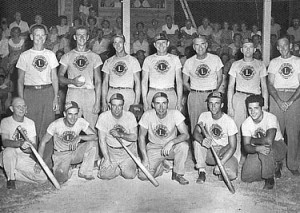
The 1948-1949 Lions Club Softball Team:
(L-R, bott
om row): Willy Dame, Alan Ballard, Red Arnau, Bob Phlegal, Jack Butler, and unidentified; (top row): M.A. Peterson, Bob Butler, Milton Vincent, Jay Mosley, Barney Chalker, Hubert Morris, and Alvin Jones.
Photo courtesy of Jack Butler
Historical Essay 23
In 1948 Harry Truman wins…a child is b
orn…and my sister, Linda, saves me at Deerfield Elementary School
Published: 15 Nov 2007
1948 was a pretty good year, and I had learned to read by then. My parents had both voted for Harry Truman for President, which made them happy when he won. Right after the election my brother Dwight was born, and I started my life’s journey as a middle child. My parents were also glad when the country of Israel, where Jesus lived, was re-established. Dad, who read the Bible a lot, said this was very important because it had been predicted in the Bible, and was something that had to happen before Jesus could come back. He was also worried about a city in Germany named Berlin, which was being surrounded by the Russians and not allowing people in or out. He was happy when our government started flying airplanes in to bring the people food. Dad bought a PolaroidTM camera that year which had just come out, but he complained about the film costing so much. My mother always wanted to see the movies which won the awards each year, so she took us to the theatre in Fort Lauderdale to see Hamlet which had won the best movie award, with a man named Lawrence Olivier, who also had won the award for best actor as the star. I believe Dad went with us to see the movie Johnny Belinda, because he always liked Jane Wyman who had won the award for best actress.
When I started second grade at Deerfield Elementary School in 1948 I was again the only boy, although one more girl had moved into town, making the ratio six to one. Badly out numbered in my own class, I tried to make friends with other boys, specifically brothers George Bigler in the third grade, and his brother Jeff in first grade. Their mother was the school cook. They actually lived in Boca Raton, but the boys attended Deerfield Elementary because their mother worked there.
They were both fun to play with at first, and excelled at climbing up palm trees. But eventually the younger brother Jeff started poking at me for no reason that I can remember. He apparently thought it was cute to come up behind me and kick me during recess. When I tried to catch him to reciprocate in kind he would run to his brother, or into the school kitchen area for his mother’s protection.
One day we were playing on the grassy area on the west side of the
main building when Jeff snuck up and kicked me from behind. I had been watching for him, and spun around quickly and caught him by his ankle before he could get away. I jumped on his back as he lay on the grass and tried to get his left arm up to where I could twist it and make him promise to leave me alone.
Suddenly I heard the sound of someone running toward us, and felt the impact as his big brother George tackled me from behind. The impact knocked me off of Jeff and the two of them proceeded with fists flying to teach me some sort of a lesson.
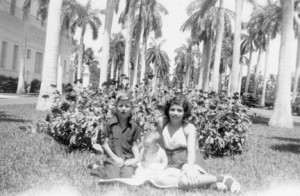
I was on my knees with both eyes shut, trying to cover my face, when I heard an even heavier running sound coming toward us with a guttural scream, which sounded quite familiar. I opened one eye and caught the image of my 10-year-old, fifth grade sister, Linda, (who incidentally looked a lot like Lucy in the Peanut cartoons) flying through the air horizontally in a counter attack against both boys. I didn’t have to do anything as she proceeded to beat the tar out of both of the Bigler boys.
I never had a problem with either of the boys after that, and I gained a respect for my sister, which continues to this day. In fact, don’t try me. She’s still lives only two hours away.
David Eller
Historical Essay 22
Games and lessons learned in first grade
At Deerfield Elementary School…1947-1948
Published: 14 Nov 2007
In the last essay I shared how I was the only boy in the first grade at Deerfield Elementary School in school years 1947-1948. I shared the class with five girls. For some reason I thought that was normal. I know I liked it. The girls all seemed to like me for some reason. They taught me how to play a game called “jacks”. It consisted of sitting in a circle on the floor in the hallway during recess with a small rubber ball and a bunch of metal things called jacks. To play you would take 10 jacks and toss them on the terrazzo floor so as not to scatter them too far apart. Then the first player would pitch the ball up in the air slightly with one hand, and immediately sweep up one jack being careful not to touch any of the other jacks. The ball would bounce once during this pr
ocess, and you had to catch it before it bounced twice while simultaneously holding the jack you’d just swept up. You would put that jack back into the box and repeat the process sweeping up two jacks, this time being careful not to touch any of the other jacks on the floor. If you were successful you would continue sweeping up three jacks the next time, and the final four jacks after that. However, you would lose immediately if at any time you did not catch the ball, or if you touched any extra jack during the process. The loser would then pass the ball and the jacks to the next player, and the game would continue until someone won by picking up all the jacks in proper order without dropping the ball.
The girls already knew the game, as they apparently had been playing it at home before starting first grade. All my preschool games had been with my friend Elmo (see previous essay) and we only played boy games like marbles, catching frogs and climbing trees. Therefore I must have appeared clumsy to the girls, as I specifically remember them laughing at me at first as I struggled to pick up the jacks and catch the bouncing rubber ball. However, I eventually got the hang of it and was able to beat all of the girls some of the time and most of the girls all of the time; but I never achieved beating all of the girls all of the time!
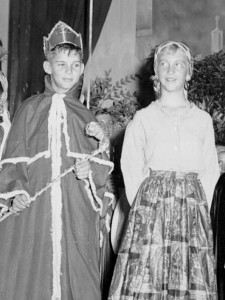
One of the girls, Lynda Dame, apparently liked me a lot. She would show her affection by walking up during recess, punching me in the belly or on the arm, and then running away laughing. I’d always been told by my parents that boys did not hit girls. Therefore Lynda was safe from me responding in kind. However, one day my mother noticed a bruise on me, and asked how I had gotten it. I told her it was from Lynda hitting me at school. Mother looked a little angry. She asked me if there was a reason for her to hit me. I told her no, that she just did it for no reason. Mother then gave me what I thought was a direct order. She told me the next time she hits you, David, you hit her back. I took that literally. Sure enough the next day during recess, Lynda slipped up on me and hit
me hard. I remembered my mother’s instructions and started chasing her. As I caught up to her I knew I had to be careful to hit her in the right place, her back. I caught her, spun her around to get a good shot, and hit her with my left fist squarely in the back with all of my might! She went down crying. I walked away proudly thinking, “I did it just like Mother said to do. I hit her right in the back”! Lynda never hit me again, and we eventually became great friends.
David Eller
Historical Essay 21
I was the only boy in the first grade at Deerfield Elementary School…in 1947
Published: 4 Oct 2007
The first thing I noticed different in the summer of 1947, at age 5 ½, was that my mother started buying me some new clothes. We lived on Dixie Highway where the tennis courts are now, and the nearest clothing store, “Parman’s” was only three blocks further south on Dixie. We would walk there. The pants she bought me were all light brown khakis with turned-up cuffs on the bottom. I didn’t particularly like the cuffs because sand, sand spurs, and other debris would collect inside the cuff as I played outside. This would get me in trouble with my mom when the sand ended up in the house on the floor. She also bought me a bunch of short sleeve plaid shirts. Every weekday for years I was destined to wear a plaid shirt with khaki pants to school. It was not a requirement of the school; it was just the way Mom liked to dress me. Today you will not find a plaid shirt or khaki pants in my closet.
My best friend was Elmo. His mother worked for my mother helping her to clean the house, and wash our clothes. Elmo and I mostly played marbles in a patch of gray sand next to the steps in the backyard. Sometimes we also played hide and seek, but Elmo didn’t stand a chance since my dog “Brownie” would always help me find him. During mango season, at the beginning of summer, we would climb the trees in our backyard, and stuff ourselves with mangos. What we didn’t eat, we’d put in a paste board box for Elmo’s mother to take and share with their neighbors.
Elmo was my friend, and we were the same age. However, one day Mother explained that I would be starting school soon, and Elmo would be going to his school. “Can I go to his school too” I remember asking? “No” she tried to explain, “Elmo has to go to his school, and you have to go to your school”. “Why”? I cried. “That’s just the way it is David!” she replied. So it was, back then.
The first day of school came, and I was up early. Mother wanted me to take a bath before getting ready for school. After the bath I put on my khaki pants and plaid shirt and was ready for an inspection. I remember Mom looking behind my ears for some reason, and then declaring that there was dirt behind my ears. She grabbed a wet wash cloth, dipped it on the soap, and vigorously started rubbing. I thought my ear was going to come off before she got satisfied and declared me clean enough to go to school.
My seven-year-old-sister left early for school to meet friends there, so I had to walk the approximate five blocks by myself. I started out from the back yard to walk one block south and then four blocks east to the school. Just as I walked out the back yard I heard Elmo’s mother, who had just arrived without Elmo, say to my mother: “Are you going to dye today?” I heard mother say “Yes!”
I continued to walk for a few minutes, simultaneously thinking about what I had just heard. Mother is going to die today, I thought. I knew she had told me she was going to miss having me home with her. But could she actually miss me so much that she would die? Suddenly I felt nauseous. Mother is going to die because she’s going to miss me so much! I don’t want to go to school if it causes my mother to die, I thought.
Suddenly I turned around and started running back home. I ran as fast as I could. When I reached the back door I swung it open and rushed in to find Mother. There she was standing next to the washing machine with a box of blue powder in her hand. I rushed to her and started hugging her crying “Please don’t die. Please don’t die!”
Mother started laughing. “David” she said, “I’m sorry we must have scared you about this dyeing business. I’m not going to be dyeing like you’re thinking; I’m only going to be dyeing some sheets and pillow cases to make them blue today.”
Greatly relieved, I rubbed my eyes, pulled myself back together and headed off for school. This time I ran all the way without stopping. I knew my teacher was going to be Mrs. Henry, and that she was also called principal. When I got to the class room, which was next to her office, there were five girls my age there. I already knew three of them from church: Lynda Dame, Janice Brown and Mildred Gordan. However, I was the only boy in my first grade class. That’s how small Deerfield was in 1947.
David Eller
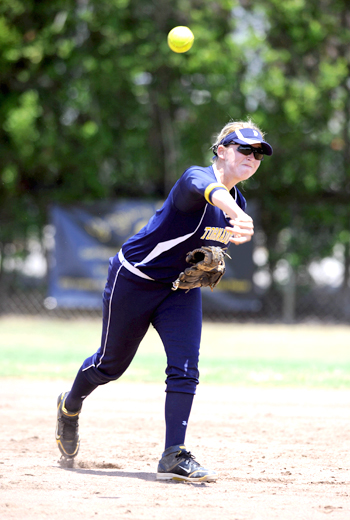






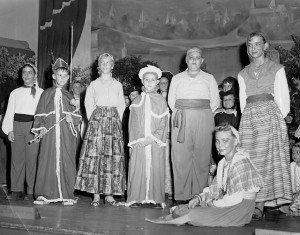
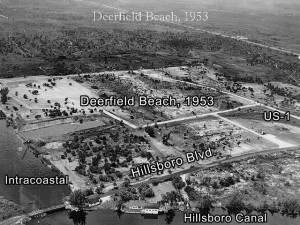
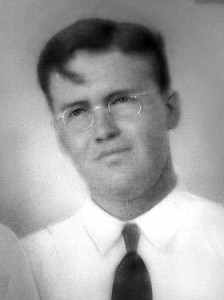
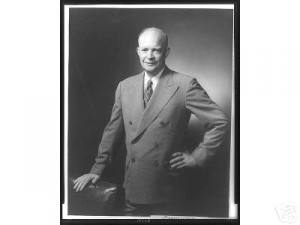
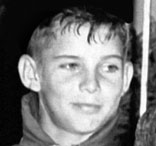
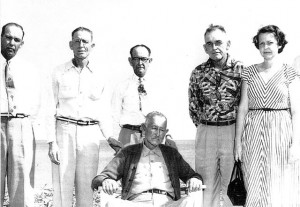
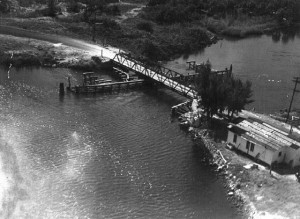 their steam engines. This stop-over allowed local farmers to load the train up with fresh vegetables, grown here in the winter time, to carry to northern markets. Jim and Emory Butler were the first members of their family to come here, and they were so successful that other family members eventually followed. Their sister, Nellie Lee Butler, married William Belton Jones of Georgia and moved here in the 1930’s. Belton Jones and his son Berney became the first bridge tenders at the Hillsboro Ave. and Intracoastal Waterway bridge. Eventually, their other five sons, Clarence, Osrich, Leo, Alvin and Emery Jones, also moved here from Georgia, as well as their daughter, Corrine Riley. Emery and Alvin Jones were my father, Marlin’s age, and the three of them became good friends. In fact, my Dad had gotten into the trucking business about that time, hauling fertilizer from Port Everglades to the Lake Okeechobee farms, and occasionally Emery Jones would go with Dad for the ride and give him a hand. The Jones boys were
their steam engines. This stop-over allowed local farmers to load the train up with fresh vegetables, grown here in the winter time, to carry to northern markets. Jim and Emory Butler were the first members of their family to come here, and they were so successful that other family members eventually followed. Their sister, Nellie Lee Butler, married William Belton Jones of Georgia and moved here in the 1930’s. Belton Jones and his son Berney became the first bridge tenders at the Hillsboro Ave. and Intracoastal Waterway bridge. Eventually, their other five sons, Clarence, Osrich, Leo, Alvin and Emery Jones, also moved here from Georgia, as well as their daughter, Corrine Riley. Emery and Alvin Jones were my father, Marlin’s age, and the three of them became good friends. In fact, my Dad had gotten into the trucking business about that time, hauling fertilizer from Port Everglades to the Lake Okeechobee farms, and occasionally Emery Jones would go with Dad for the ride and give him a hand. The Jones boys were